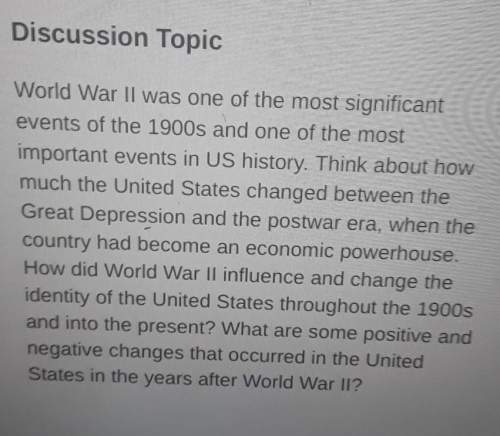
History, 15.10.2019 11:10 bryan519688
When was the last time the bill of rights changed? (date)

Answers: 3


Other questions on the subject: History

History, 21.06.2019 18:00, Arealbot
The congress shall have power to lay and collect taxes, duties, imposts and excises, to pay the debts and provide for the common defence and general welfare of the united states . .; to borrow money on the credit of the united states; to regulate commerce with foreign nations, and among the several states, and with the indian tribes. —constitution of the united states, article i, section 8 which of these are expressed powers granted by this part of article i, section 8? check all that apply. lay and collect taxes and duties pay debts regulate american indian groups regulate commerce within states borrow money regulate commerce with foreign nations
Answers: 3

History, 21.06.2019 19:30, zoeycrew
In the decision for dred scott vs. sanford, (1857) in which a slave petitioned for his freedom in a st. louis court, on the grounds that his owner had taken him into free territory, and thus he ought no longer be regarded as possessing "slave" status, but should be regarded as a free man, the court decided as follows (excerpt): "in the circuit courts of the united states, the record must show that the case is one in which by the constitution and laws of the united states, the court had jurisdiction--and if this does not appear, and the court gives judgment either for plaintiff or defendant, it is error, and the judgment must be reversed by this court--and the parties cannot by consent waive the objection to the jurisdiction of the circuit court. a free negro of the african race, whose ancestors were brought to this country and sold as slaves, is not a 'citizen' within the meaning of the constitution of the united states. when the constitution was adopted, they were not regarded in any of the states as members of the community which constituted the state, and were not numbered among its 'people or citizen.' consequently, the special rights and immunities guarantied to citizens do not apply to them. and not being "citizens" within the meaning of the constitution, they are not entitled to sue in that character in a court of the united states, and the circuit court has not jurisdiction in such a suit. the only two clauses in the constitution which point to this race, treat them as persons whom it was morally lawful to deal in as articles of property and to hold as slaves. since the adoption of the constitution of the united states, no state can by any subsequent law make a foreigner or any other description of persons citizens of the united states, nor entitle them to the rights and privileges secured to citizens by that instrument." why does the court say that the petitioning party in this case had no right to sue for his freedom? a) because he is too young b) because he is from a different state c) because he is "of the african race" with enslaved ancestors d) because he is, properly speaking, within his owner's jurisdiction
Answers: 1


History, 21.06.2019 22:30, deshawnnash53
The second continental congress: a. made provisions for a continental army with george washington as commander-in-chief b. adopted a “declaration of causes of necessity of taking up arms” c. endorsed the olive branch petition d. all of the above
Answers: 1
You know the right answer?
When was the last time the bill of rights changed? (date)...
Questions in other subjects:






Mathematics, 20.02.2022 02:20







